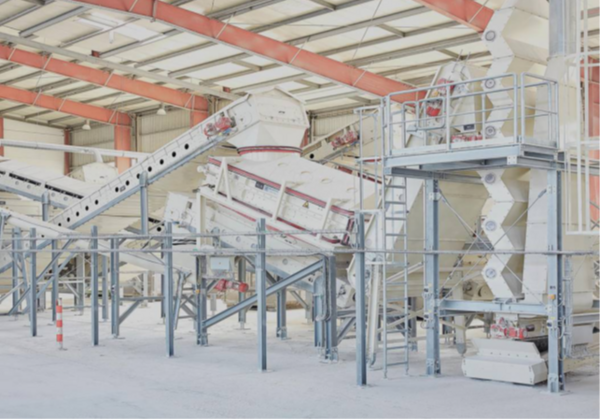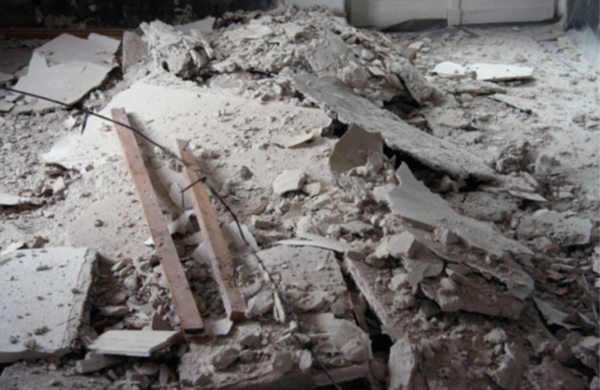GipsRec2.0
GipsRec 2.0 - Gypsum fiberboards and synthetic gypsum for the production of RC gypsum
Resource-efficient circular economy - construction and mineral material cycles (ReMin)
In the GipsRec 2.0 project, technical, economic and ecological investigations and evaluations of the potential development of end-of-life gypsum fiberboards and various synthetic gypsums are to be carried out. The aim is to expand the secondary raw material potential for RC gypsum production.
The project is being funded as part of the "Resource-efficient circular economy - construction and mineral material cycles (ReMin)" funding measure. "ReMin" is part of the BMBF research concept "Resource-efficient circular economy" and aims at resource-efficient construction and the extended use of mineral secondary raw materials from construction waste, slag, ash and mining residues.
Relevance of recycled gypsum
More than half of the gypsum currently consumed in Germany comes from flue gas desulphurization plants from coal-fired power generation in the form of FGD gypsum. The remaining demand is currently still covered almost exclusively by the extraction of domestic natural gypsum. Against the backdrop of the energy transition, a sharp decline in the supply of FGD gypsum is to be expected, while at the same time it is becoming increasingly difficult to designate new gypsum mining areas. It is therefore imperative to look for new sources of gypsum recycling. Gypsum fiberboards are now produced in considerable quantities, but are not yet recycled. Technical processing tests are being carried out to investigate a future recycling technology. Furthermore, gypsum and anhydrite are also produced in chemical processes such as acid neutralization. It is therefore important to understand which industrial processes also produce gypsum and the quality of these waste gypsums and whether they are suitable for further processing into recycled gypsum. The project will investigate the potential of these waste groups throughout Germany. The Federal Institute for Materials Research and Testing (BAM), the Öko-Institut e. V. and Mitteldeutsche Umwelt- und Entsorgung GmbH (MUEG) are participating.
Theoretical and technical aspects
Work package 1 is led by BAM and deals with the theoretical potential for increasing the gypsum recycling rate by using additional gypsum sources. For the types of waste under consideration (gypsum fiberboard, various synthetic gypsums), not only the quality and quantity but also the sources and the associated transport of the materials play a role. The information for this is obtained through research, surveys or interviews with experts. The results will ultimately be examined and evaluated for their potential to replace FGD and natural gypsum.
MUEG is in charge of work package 2. Here, the technical aspects of future waste recycling are examined. First of all, the quality of individual material flows is evaluated with the help of the material analyses of various wastes. From this data, conclusions can be drawn about possible ways of diverting potential recyclable fractions and suitable processing technology. This will be verified by means of practical tests on a pilot plant scale and evaluated for large-scale implementation.

Ecological and economic studies
The Öko-Institut is in charge of work package 3, which comprises the ecological assessment of the environmental impact of future waste recycling. Eco-balances and sensitivity analyses are being prepared for the gypsum fiberboards and for selected synthetic gypsums in relation to the project.
Work package 4 is intended for the economic analysis of the developed special gypsum recycling processes within the framework of economic feasibility studies. MUEG is in charge of the work. These studies will assess the feasibility of the technology considered in work package 2 for recycling the gypsum-containing waste under consideration.
The results will be summarized in work package 5. The knowledge gained can thus be made available to interested companies in the relevant sectors of waste disposal and recycling. In addition, target group-specific recommendations will be made to industry, politics, etc.

Funding measure
Resource-efficient circular economy - construction and mineral material cycles (ReMin)
Project title
GipsRec 2.0 - Gypsum recycling 2.0: Technical preparation of the availability of gypsum fiberboards and synthetic gypsum for the production of RC gypsum
Duration
01.02.2021-31.01.2024
Funding reference
033R267
Funding volume of the association
617,747.22 euros
Contact
Dipl.-Ing. Jörg-Michael Bunzel
MUEG Mitteldeutsche Umwelt- und Entsorgung GmbH
Geiseltalstraße 1
06242 Braunsbedra
Email: joerg-michael.bunzel@mueg.de
Phone: 034633 41 115/ 0151 18042725
Project participants
Mitteldeutsche Umwelt- und Entsorgung GmbH; Öko-Institut e. V.; Federal Institute for Materials Research and Testing
Data sheet
Download data sheet